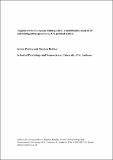Files in this item
Arguments for European disintegration : a mobilization analysis of anti-immigration speeches by U.K. political leaders
Item metadata
| dc.contributor.author | Portice, Jennie | |
| dc.contributor.author | Reicher, Stephen | |
| dc.date.accessioned | 2019-12-12T00:38:05Z | |
| dc.date.available | 2019-12-12T00:38:05Z | |
| dc.date.issued | 2018-12-12 | |
| dc.identifier.citation | Portice , J & Reicher , S 2018 , ' Arguments for European disintegration : a mobilization analysis of anti-immigration speeches by U.K. political leaders ' , Political Psychology , vol. 39 , no. 6 , pp. 1357-1372 . https://doi.org/10.1111/pops.12551 | en |
| dc.identifier.issn | 0162-895X | |
| dc.identifier.other | PURE: 256116444 | |
| dc.identifier.other | PURE UUID: ef762274-6bc1-4d9c-a3c0-f858b27032c2 | |
| dc.identifier.other | Scopus: 85058477242 | |
| dc.identifier.other | WOS: 000453026600010 | |
| dc.identifier.uri | https://hdl.handle.net/10023/19123 | |
| dc.description.abstract | In this paper we develop a mobilisation analysis of contemporary antagonism to immigrants. We argue that such antagonism does not arise spontaneously from the cognitions of ordinary people but is mobilised by political actors. This leads us to ask why politicians mobilise such antagonisms and how they do so. Our analysis, illustrated by set piece speeches on immigration by the four main UK party political leaders in the period prior to the 2015 elections, suggests (a) that while these speeches are ostensibly about an intergroup issue they equally serve intra-group dynamics, notably demonstrating how the speaker serves national interests and hence qualifies to serve as a national representative; (b) the way that speakers mobilise antagonism to immigrants is through construing a variety of forms of threat: spatial threat, economic threat, security threat and diversity threat. We focus particularly on the last of these because of the ways in which it invokes social psychological arguments and hence speaks in our name. We conclude by raising issues of accountability – both of politicians and social psychologists – regarding the way we talk about immigration. | |
| dc.language.iso | eng | |
| dc.relation.ispartof | Political Psychology | en |
| dc.rights | Copyright © 2018 International Society of Political Psychology. This work has been made available online in accordance with the publisher’s policies. This is the author created accepted version manuscript following peer review and as such may differ slightly from the final published version. The final published version of this work is available at https://doi.org/10.1111/pops.12551 | en |
| dc.subject | Immigration | en |
| dc.subject | Mobilization | en |
| dc.subject | Social identity | en |
| dc.subject | Threat | en |
| dc.subject | Social cohesion | en |
| dc.subject | BF Psychology | en |
| dc.subject | T-NDAS | en |
| dc.subject | SDG 10 - Reduced Inequalities | en |
| dc.subject.lcc | BF | en |
| dc.title | Arguments for European disintegration : a mobilization analysis of anti-immigration speeches by U.K. political leaders | en |
| dc.type | Journal article | en |
| dc.description.version | Postprint | en |
| dc.contributor.institution | University of St Andrews. School of Psychology and Neuroscience | en |
| dc.contributor.institution | University of St Andrews. Centre for Research into Equality, Diversity & Inclusion | en |
| dc.contributor.institution | University of St Andrews. St Andrews Sustainability Institute | en |
| dc.identifier.doi | https://doi.org/10.1111/pops.12551 | |
| dc.description.status | Peer reviewed | en |
| dc.date.embargoedUntil | 2019-12-12 |
This item appears in the following Collection(s)
Items in the St Andrews Research Repository are protected by copyright, with all rights reserved, unless otherwise indicated.

